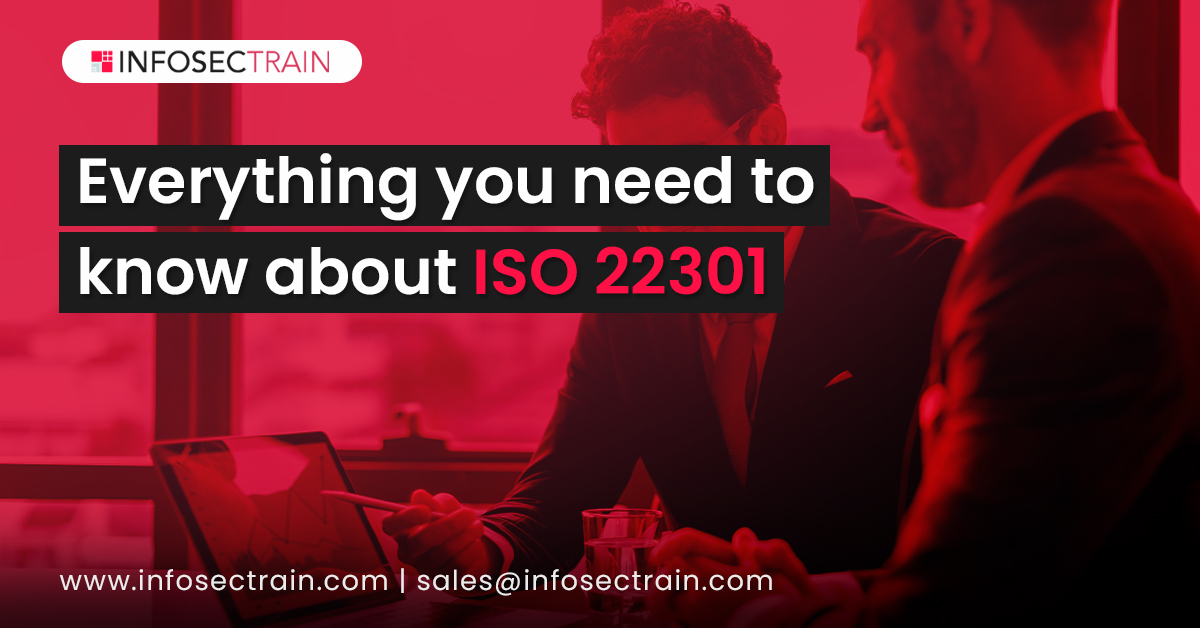Everything you need to know about ISO 22301
ISO 22301 defines the conditions that an organization must apply to approve a Business Continuity Management System (BCMS). To comply with the terms of this standard, the organization needs to document a model to develop, implement, operate, monitor, review, maintain, and improve a BCMS to increase the resilience of an organization in case of a disaster.

ISO 22301:2019 is the updated version of the international standard for Business Continuity Management Systems. This standard implements a best practice framework to help organizations effectively manage the impact of a disruption to their regular operation. The purpose of the standard is not necessary to perform the total reduction of impact from disruption. It is to support an organization to know the amount and type of impact it is willing to accept following a disruption. After which the organization generates a business continuity system sized correctly for the organizational need.
What is BCP?
Business Continuity is an organization’s capability to maintain primary functions during and after a disaster has occurred. Business Continuity Planning builds risk management processes and procedures that aim to prevent interruptions to mission-critical services and re-establish full function to the organization as quickly and efficiently as possible.
The standard basic business continuity requirement is to keep essential functions up and operating during a disaster and recover with as little downtime as possible. A business continuity plan considers various irregular events, such as natural disasters, fires, disease outbreaks, cyberattacks, and other external threats.
What is BCMS?
The purpose of the Business Continuity Management System is to prepare for, provide and maintain controls and capabilities for managing an organization’s overall ability to continue to operate during disruptions.
What are the benefits of BCMS for business?
- Visible Resilience: An effective BCMS gives evidence to current and potential customers of organizational preparedness for disruption. This is especially important in sectors where disruption can have substantial impacts on people’s lives as well as financial impacts, including government, financial, defense, and social services.
- Competitive Advantage: It may win business from competitors that are incapable to operate or are doing so in a diminished capacity. A company can produce reputational benefits that will attract customers as well as benefit from stronger financial capabilities. A Business Continuity Management System helps an organization to bid or tender more efficiently.
- Protect Organization Value: A BCMS helps to decrease the negative impact of a disruptive event. This can save the organization a significant amount of money, time, and reputational implications.
ISO 22301 needs the implementation of a Business Continuity Management System (BCMS), which indicates the importance of implementing and operating controls and measures for managing an organization’s overall ability to manage disruptive incidents. ISO 27001 needs the implementation of an Information Security Management System (ISMS), which maintains the confidentiality, integrity, and availability of information.
What to implement first: ISO 22301 or ISO 27001?
If your organization faces a number of non-IT threats (each of them being able to stop operations), and if your IT is just helping your business processes, you might get more “bang for your buck” concentrating on implementing Business Continuity Management, based on ISO 22301.
On the other hand, if you are not providing any physical deliverables, but you just deal with digital products and information technology processes are the heart of your organization, you should implement an Information Security Management System based on ISO 27001.
The 10 Clauses of ISO 22301:2019
ISO 22301 consists of 10 sections, known as Clauses. It comes under Clauses 4.0 – 10.0.
Clause 1: Scope
Clause 2: Normative References
Clause 3: Terms and definition
- Business Continuity
- Business Continuity Management
- Business Continuity Plan
- Business Impact Analysis
- Crisis Management Team
- Disruption
- Invocation
- Maximum Tolerable Period of Disruption (MTPD)
- Minimum Business Continuity Objective (MBCO)
- Recovery Point Objective (RPO)
- Recovery Time Objective (RTO)
Clause 4: Context of the organization
- Internal Context
- External Context
- Interested Parties
- Legal and Regulatory
- Scope of the Management System
Clause 5: Leadership
- Business Continuity Policy
- Roles and Responsibilities
- Evidencing Leadership to an Auditor
Clause 6: Planning
- Addressing Risk and Opportunities
- Business Continuity Objectives
- Achieving Objectives
- Achieving Objectives
Clause 7: Support
- Competence
- Awareness
- Communication
- Documented Information
Clause 8: Operation
- Business Impact Analysis and Risk Assessment
- Business Impact Analysis
- Risk Assessment
- Business Continuity Strategy and Solutions
- Business Continuity Plans
- Evaluation of Business Continuity Documentation and Capabilities
Clause 9: Performance evaluation
- Monitoring, Measurement, Analysis, and Evaluation
- Internal Audit
- Audit Programme Audits
- Management Review
Clause 10: Improvement
- Nonconformity and Corrective Action
- Root Cause Analysis
Importance of ISO 22301 Certification?
Obtaining ISO 22301 Certification should be high on the priority list of organizations that need to prove to their stakeholders that they can immediately overcome operational disruptions to provide continued and effective service. Gaining ISO 22301 Certification puts the organization within an individual group of companies committed to business resilience.
How can I get ISO 22301 certification Training:
InfosecTrain is one of the leading IT security training providers. We offer a comprehensive training program for ISO 22301 Certification. If you want to take the expert’s help in getting through the ISO 22301 certification exam, check these ISO 22301 certification training courses offered by Infosec Train:
https://www.infosectrain.com/courses/iso22301f/
https://www.infosectrain.com/courses/iso22301li/
https://www.infosectrain.com/courses/iso22301la/






 1800-843-7890 (India)
1800-843-7890 (India)